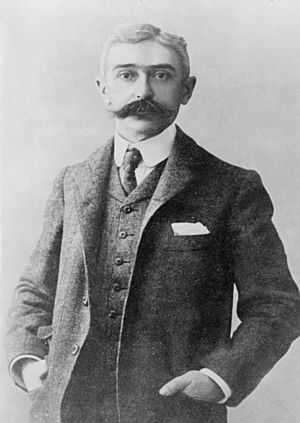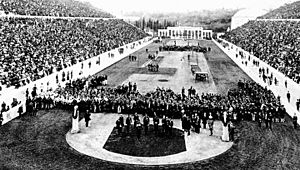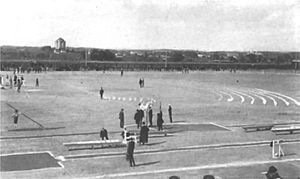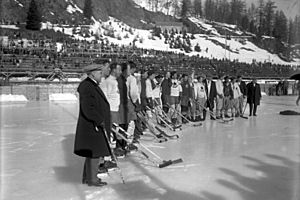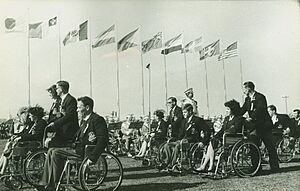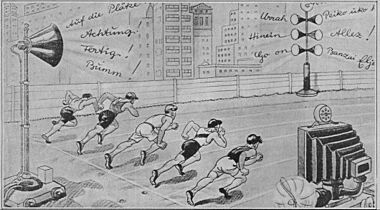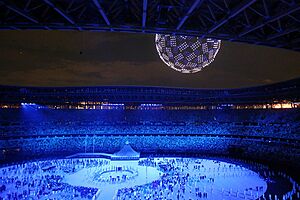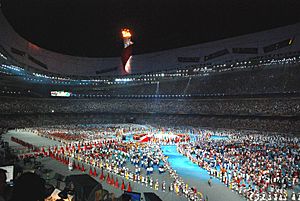Olympic Games facts for kids
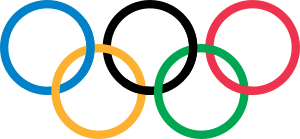 |
|
| Abbreviation | Olympiad (for summer games only) |
|---|---|
| Motto | |
| First event | Summer Athens, Greece in 1896 Winter Chamonix, France in 1924 |
| Occur every | Four years, alternated two years during the four-year cycle |
| Headquarters | Lausanne, Switzerland |
| President | Kirsty Coventry |
The Olympic Games are the world's biggest sports events. They include summer and winter competitions where thousands of athletes from all over the world compete. These games are open to both amateur and professional athletes. More than 200 teams take part, each representing a country or territory. The Olympics happen every four years. Since 1994, the Summer and Winter Olympics have taken turns every two years within this four-year cycle, called an Olympiad.
The idea for the modern Olympics came from the ancient Olympic Games. These were held in Olympia, Greece, for many centuries. Baron Pierre de Coubertin started the International Olympic Committee (IOC) in 1894. This led to the first modern Games in Athens in 1896. The IOC is the main group that organizes everything about the Olympics. The Olympic Charter sets out their rules and powers.
Over the years, the Olympic Games have changed a lot. New events were added, like the Winter Olympics for snow and ice sports. There are also the Paralympic Games for athletes with disabilities and the Youth Olympic Games for young athletes aged 14 to 18. The IOC also supports the Deaflympics and the Special Olympics. The rules about who can compete have changed too. At first, only amateur athletes (who didn't get paid for their sport) could join. Now, professional athletes can also take part. The Games have also become very popular on TV, leading to more corporate sponsorship and business involvement.
Some Olympic Games were cancelled because of World Wars I and II (in 1916, 1940, and 1944). Large boycotts during the Cold War meant fewer countries participated in the 1980 and 1984 Olympics. The 2020 Olympics were moved to 2021 because of the COVID-19 restrictions.
The Olympic Movement includes international sports groups, national Olympic committees, and special committees that organize each Games. The IOC chooses the host city, plans the Games, and decides which sports will be included. There are many Olympic traditions and symbols, like the Olympic flag, the Olympic flame and torch relay, and the opening and closing ceremonies. Over 14,000 athletes competed in the 2020 Summer Olympics and 2022 Winter Olympics. They took part in 40 different sports and 448 events. The top three athletes in each event receive Olympic medals: gold, silver, and bronze.
The Games have grown so much that almost every country is now represented. Even some colonies and territories can send their own teams. This growth has brought challenges, like boycotts, doping, and other issues. Every two years, the Olympics give athletes a chance to become famous. They also let the host city and country show themselves off to the world. Hosting the Games can bring big economic benefits, but also challenges for the host city.
Contents
- Ancient Olympic Games: A Look Back
- Modern Olympic Games: A New Beginning
- International Olympic Committee: The Organizers
- Money and the Olympics
- Olympic Symbols: What They Mean
- Olympic Ceremonies
- Olympic Sports: What's Played
- Citizenship and Olympic Rules
- Olympic Champions and Medallists
- Participating Nations and Host Cities
- More to Explore
- Cool Facts About the Olympics
- See also
Ancient Olympic Games: A Look Back
The "Ancient Olympic Games" were religious and sports festivals. They were held every four years at a special place for Zeus in Olympia, Greece. The festival usually happened in late August or early September. This was after the yearly harvest but before the olives were picked. Messengers were sent out to announce the dates.
At first, only "legitimate sons of free-born Greek parents" could compete. Later, after Macedonia and Rome took over Greece, anyone who spoke Greek could join. Tens of thousands of Greeks traveled to attend the festival. These Games mostly had athletic events. They also included combat sports like wrestling and pankration, plus horse and chariot races.
Many people believe that all wars stopped during the Games. This was called the Olympic peace or truce. However, this is a modern myth. The truce only allowed religious travelers to pass safely through warring areas. They were protected by Zeus.
The start of the Olympics is a bit of a mystery. One popular story says Heracles and his father Zeus began the Games. Legend says Heracles first called them "Olympic" and started the tradition of holding them every four years. After his twelve labours, he built the Olympic Stadium to honor Zeus. He walked 200 steps in a straight line and called this distance a "stadion". This later became a unit of distance.
The most common start date for the Ancient Olympics is 776 BC. This date comes from old records found at Olympia. These records list the winners of a footrace held every four years. For the first thirteen Olympics, the stadion footrace was the only event. Winning this race was so important that the next Olympiad was named after the winner. The Ancient Games changed over time. They included running, a pentathlon (jumping, discus, javelin, foot race, wrestling), boxing, wrestling, pankration, and horse events. Coroebus, a cook, is said to be the first Olympic champion. This shows that the competition was not just for rich people.
The Olympics were very important for religion. The sports events happened alongside sacrifices to Zeus and Pelops. Winners were greatly admired and remembered in poems and statues. The only official prize was a wreath from a sacred olive tree. But winners also gained wealth and support from their hometowns. The Games were held every four years. This period, called an Olympiad, was used by Greeks to measure time. The Games were part of a bigger series called the Panhellenic Games.
The Olympic Games were most successful in the 6th and 5th centuries BC. But they slowly became less important as the Romans gained power. Most historians agree the Games officially ended in 393 AD. This was when Emperor Theodosius I ordered all pagan practices to stop. Another date often mentioned is 426 AD, when his successor ordered the destruction of Greek temples.
Modern Olympic Games: A New Beginning
Early Olympic Events
The word "Olympic" was used for sports events even before the modern Games began. In the 1600s, the Cotswold Games in England were called "Cotswold Olimpick Games." These were annual sports meetings. The British Olympic Association has called them "the first stirrings of Britain's Olympic beginnings."
In France, a national Olympic festival called L'Olympiade de la République was held from 1796 to 1798. It tried to copy the ancient Greek Olympics. The 1796 Games also introduced the metric system to sports.
In the 1830s and 1840s, Olympic games were held in Sweden. In 1850, William Penny Brookes started an "Olympian Class" in England. In 1859, he changed the name to the Wenlock Olympian Games. This yearly sports festival still happens today.
Between 1862 and 1867, Liverpool held a "Grand Olympic Festival." These games were the first to be fully amateur and international. The sports program for the first modern Olympics in Athens in 1896 was very similar to Liverpool's. In 1865, Brookes and others founded the National Olympian Association. This group helped create the rules for the International Olympic Charter. In 1866, a national Olympic Games was held in London.
Bringing the Games Back
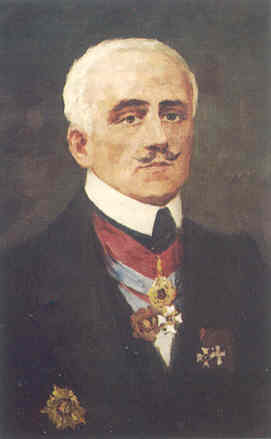
Greeks wanted to bring back the Olympic Games after their independence from the Ottoman Empire in 1821. Poet Panagiotis Soutsos first suggested it in 1833. Evangelos Zappas, a rich Greek-Romanian, offered to pay for a permanent return of the Games in 1856.
Zappas sponsored the first Olympic Games in 1859 in Athens. Athletes from Greece and the Ottoman Empire took part. Zappas also paid to restore the ancient Panathenaic Stadium. This stadium then hosted the Olympics in 1870 and 1875.
In 1890, Baron Pierre de Coubertin was inspired after seeing the Wenlock Olympian Games. He wanted to promote peace and friendship through sports. He decided to create the International Olympic Committee (IOC). Coubertin used ideas from Brookes and Zappas. He wanted to have Olympic Games that moved to different cities around the world every four years. He shared these ideas at the first Olympic Congress in Paris in June 1894. On the last day, they decided the first IOC-led Olympic Games would be in Athens in 1896. The Greek writer Demetrius Vikelas became the first IOC president.
The 1896 Games in Athens
The first Games organized by the IOC happened in the Panathenaic Stadium in Athens in 1896. Fourteen nations and 241 athletes competed in 43 events. Zappas and his cousin had left money to help fund future Olympic Games. This money helped pay for the 1896 Games. George Averoff also gave a lot of money to fix up the stadium. The Greek government also helped pay, hoping to get money back from ticket sales and special Olympic stamps.
Greek officials and the public were very excited to host the Games. Many athletes felt the same way and even asked for Athens to be the permanent host city. But the IOC wanted the Games to move to different cities worldwide. The next Olympics were held in Paris.
How the Games Have Changed
After the successful 1896 Games, the Olympics struggled for a while. The Games held at the Paris Exposition in 1900 and in St. Louis in 1904 did not get much attention. In the 1904 Olympics, most of the 650 athletes were American. The winner of the marathon was even disqualified for riding in a car during the race!
The Games got back on track with the 1906 Intercalated Games in Athens. These Games attracted many international participants and a lot of public interest. This marked the start of the Olympics becoming more popular and bigger.
Winter Sports Join the Olympics
The Winter Olympics were created for sports played on snow and ice. These sports were hard to hold during the Summer Games. Figure skating and ice hockey were already part of the Summer Olympics in 1908 and 1920. The IOC wanted to add more winter sports. In 1921, they decided to have a winter version of the Olympic Games. A winter sports week was held in Chamonix, France, in 1924. This event became the first Winter Olympic Games.
At first, the idea was for the same country to host both the Winter and Summer Games in the same year. But this idea was quickly dropped. The IOC decided the Winter Games would happen every four years, in the same year as the Summer Games. This continued until the 1992 Games. After that, starting with the 1994 Games, the Winter Olympics were held every four years, but two years after each Summer Olympics.
Paralympic Games for Athletes with Disabilities
In 1948, Sir Ludwig Guttmann wanted to help soldiers recover after World War II. He organized a sports event for several hospitals at the same time as the 1948 London Olympics. This event became an annual sports festival. Over the next 12 years, Guttmann and others worked to use sports for healing.
In 1960, Guttmann brought 400 athletes to Rome to compete in the "Parallel Olympics." These ran at the same time as the Summer Olympics. They became known as the first Paralympics. Since then, the Paralympics have been held in every Olympic year. Starting with the 1988 Summer Games in Seoul, the city hosting the Olympics also hosts the Paralympics. The IOC and the International Paralympic Committee (IPC) agreed in 2001 that host cities would manage both the Olympic and Paralympic Games. This agreement started with the 2008 Summer Games in Beijing and the 2010 Winter Games in Vancouver.
Youth Olympic Games
In 2010, the Youth Games were added to the Olympic family. These games give athletes aged 14 to 18 a chance to compete. IOC president Jacques Rogge first thought of the Youth Olympic Games in 2001. The first Summer Youth Games were held in Singapore in August 2010. The first Winter Games were in Innsbruck, Austria, two years later. These Games are shorter than the main Olympics. The summer version lasts twelve days, and the winter version lasts nine days. The sports are similar to the senior Games, but with some changes, like mixed teams.
The Olympics in the 21st Century
Over 14,000 athletes competed in the 2020 Summer Olympics and 2022 Winter Olympics combined. They took part in 40 different sports and 448 events. The Summer Olympics have grown from 241 participants from 14 nations in 1896 to over 11,300 competitors from 206 nations in 2020. The Winter Olympics are smaller. For example, Beijing hosted 2,971 athletes from 91 nations in 2022. Most athletes and officials stay in the Olympic Village during the Games. This village has everything they need, like cafeterias and health clinics.
The IOC allows National Olympic Committees (NOCs) to represent individual nations. These NOCs do not have to be fully independent countries. So, places like Puerto Rico, Bermuda, and Hong Kong can compete as separate teams. The Olympic Charter now says new NOCs can only be formed for "an independent State recognised by the international community."
How Much Do the Games Cost?
Hosting the Olympic Games is very expensive. Studies show that since 1960, the sports-related costs for the Summer Games were about US$5.2 billion on average. For the Winter Games, it was about US$3.1 billion. These numbers do not include bigger costs like new roads or airports. The 2008 Beijing Games cost about US$40–44 billion. The 2014 Sochi Winter Games cost US$51 billion.
The cost per athlete for London 2012 was US$1.4 million. For Sochi 2014, it was US$7.9 million. Budget overruns are common for the Games. This means the actual costs are often much higher than what was first planned. For example, the 1976 Summer Games in Montreal had a 720% cost overrun. This means the final cost was more than seven times the original budget.
The 1984 Summer Games in Los Angeles were different. They used existing buildings and got money from sponsors. This helped them make a profit of US$225 million. This was a huge amount at the time. The money was used to help youth sports. The 1984 Games are seen as a good example of how to manage costs.
Hosting the Games is financially risky. The final cost for the Tokyo 2020 Olympics was about US$13 billion. They managed to balance their budget by increasing income and checking expenses. They got money from the IOC, sponsors, and insurance for the delay.
Impact on Host Cities
Some experts are unsure about the economic benefits of hosting the Olympics. They say these big events often cost a lot but don't bring many long-term benefits. However, hosting or even bidding for the Olympics can increase a country's exports. It shows the world that the country is open for trade. Research also suggests that hosting the Summer Olympics can increase donations from companies in the host city. This helps local non-profit groups.
The Games have sometimes had negative effects on local communities. For example, over two million people were moved from their homes because of the Olympics in two decades. This often affected disadvantaged groups more. The 2014 Winter Olympics in Sochi were the most expensive ever. Some reports said the cost would not boost Russia's national economy. Eight months after the Games, Sochi felt like a "ghost town" because the stadiums were spread out and infrastructure was unfinished.
Many cities have stopped bidding for the Winter Olympics because of the high costs or lack of local support. This has made it harder to find host cities. For the 2024 Summer Olympics, only Paris and Los Angeles were left. So, the IOC decided to award both the 2024 Games to Paris and the 2028 Games to Los Angeles at the same time. Both cities were praised for their plans to use existing buildings.
International Olympic Committee: The Organizers
The Olympic Movement includes many national and international sports groups. It also includes athletes, officials, judges, and anyone who follows the Olympic Charter rules. The International Olympic Committee (IOC) is the main group. It chooses the host city, plans the Games, decides which sports are included, and handles sponsorships and TV rights.
The Olympic Movement has three main parts:
- International Federations (IFs) are the groups that manage a sport worldwide. For example, FIFA manages football. There are 35 IFs for Olympic sports.
- National Olympic Committees (NOCs) represent the Olympic Movement in each country. For example, the Russian Olympic Committee is the NOC for Russia. The IOC recognizes 206 NOCs.
- Organizing Committees for the Olympic Games (OCOGs) are temporary groups. They are in charge of organizing each Olympic Games. They are dissolved after the Games are over.
French and English are the official languages of the Olympic Movement. The language of the host country is also used. During ceremonies, announcements are made in French, then English, and then the host country's main language (if it's not English or French).
In March 2025, Kirsty Coventry became the first woman and first African to be elected as President of the IOC. Coventry wants the Olympics to be a symbol of global unity. She aims to bring different cultures and nations together through sports. Her goal is to make sure every nation has an equal chance to shine, keeping sports separate from politics.
Concerns About Fairness
The IOC has sometimes been criticized. Some past leaders, like Avery Brundage and Juan Antonio Samaranch, faced controversy. Brundage strongly believed in amateurism and was against business involvement. But this view became outdated as sports changed. Athletes from Eastern Bloc countries were paid by their governments to train full-time. This put Western amateur athletes at a disadvantage. Brundage was also accused of racism.
Under Samaranch, the IOC was accused of favoritism and corruption. In 1998, it was reported that some IOC members had received gifts from the Salt Lake City bid committee for the 2002 Winter Olympics. This led to several investigations. Even though nothing strictly illegal happened, accepting gifts was seen as wrong. As a result, ten IOC members were removed, and ten more were punished. Stricter rules were put in place for future bids. New limits were set for how long IOC members could serve and their age. Fifteen former Olympic athletes were also added to the committee. Despite these issues, the 2002 Olympics were very successful financially.
In 1999, it was reported that the Nagano Olympic Organizing Committee spent a lot of money on entertaining IOC members for the 1998 Winter Olympics bid. The exact amount is unknown because Nagano destroyed the financial records.
In 2004, a BBC documentary claimed that bribes were used in the bidding process for the 2012 Summer Olympics. The mayor of Paris accused the British prime minister and the London bid committee of breaking rules. The bid by Turin for the 2006 Winter Olympics also faced accusations of bribery. These accusations led to investigations and may have helped Turin win the bid.
Money and the Olympics
Sponsorships and Advertising
The Olympic Games have had sponsors since the first Games in Athens in 1896. Companies like Kodak paid for advertising. In 1908, Oxo and Odol mouthwash became official sponsors of the London Games. Coca-Cola first sponsored the Summer Olympics in 1928 and has been a sponsor ever since. Before the IOC took control, national Olympic committees handled their own sponsorship deals.
IOC Takes Control of Money
The IOC originally didn't want money from corporate sponsors. But after IOC President Avery Brundage retired in 1972, the IOC started to see the potential of television and advertising. Under Juan Antonio Samaranch, the Games began to work with international sponsors.
In the first half of the 20th century, the IOC had a small budget. Brundage, who was president from 1952 to 1972, rejected all attempts to link the Olympics with business. He believed that corporate interests would unfairly influence the IOC. When Brundage retired, the IOC had US$2 million. Eight years later, it had US$45 million. This was mainly because of a change in how they thought about money. They started to expand the Games through corporate sponsorship and selling TV rights. When Juan Antonio Samaranch became IOC president in 1980, he wanted the IOC to be financially independent.
The 1984 Summer Olympics were a turning point. The Los Angeles organizing committee made a profit of US$225 million. This was a record at the time. They did this by selling exclusive sponsorship rights to certain companies. The IOC wanted to control these rights. Samaranch helped create The Olympic Programme (TOP) in 1985 to build the Olympic brand. Being a TOP member is very exclusive and expensive. Companies pay US$50 million for a four-year membership. TOP members get exclusive global advertising rights for their products and can use the Olympic rings in their ads.
The Power of Television
The 1936 Summer Olympics in Berlin were the first Games shown on television, but only to local viewers. The 1956 Winter Olympics in Italy were the first to be shown internationally on TV. For the 1960 Winter Games, TV rights were sold for the first time to special TV networks. CBS paid US$394,000 for the American rights.
In the following years, the Olympics became a big part of the Cold War rivalry. The IOC wanted to use this interest through TV. Selling broadcast rights helped the IOC make the Games more visible. This created more interest, which made TV advertising more appealing. This cycle allowed the IOC to charge more and more for these rights. For example, CBS paid US$375 million for the American rights to the 1998 Nagano Games. NBC spent US$3.5 billion for the American rights to air every Olympic Games from 2000 to 2012.
In 2011, NBC agreed to a US$4.38 billion contract with the IOC to broadcast the Olympics until the 2020 Games. This was the most expensive TV rights deal in Olympic history. NBC then extended this deal for US$7.75 billion in May 2014, to air the Olympics until the 2032 Games. NBC also got the American TV rights for the Youth Olympic Games and the Paralympic Games. More than half of the IOC's global sponsors are American companies. NBC is a major source of money for the IOC.
On March 13, 2025, it was announced that Comcast would pay the IOC US$3 billion to air the Olympics until 2036. This deal makes Comcast a "Strategic Partner." This means NBC will air the 2026 Milano-Cortina Winter Olympics, the 2028 Los Angeles Olympics, the 2030 French Alps Winter Olympics, the 2032 Brisbane Olympics, the 2034 Salt Lake City-Utah Winter Olympics, and the 2036 Olympic Games. The 2036 Games will mark 100 years since the first televised Games in Berlin.
TV viewership grew a lot from the 1960s to the end of the 20th century. This was because of satellites for live TV broadcasts starting in 1964 and color TV in 1968. The global audience for the 1968 Mexico City Games was about 600 million. By the 1984 Los Angeles Games, it was 900 million. This number grew to 3.5 billion by the 1992 Barcelona Games. With such high costs for broadcasting, TV networks asked the IOC for changes to boost ratings. The IOC responded by changing the Olympic program. For example, gymnastics events were expanded. Swimming and diving events were also expanded because they are popular on TV. Because NBC pays so much, the IOC has allowed them to influence event schedules. This helps maximize U.S. TV ratings. For example, swimming finals in Beijing (2008) and Tokyo (2020) were held in the mornings. This was so they would be shown during prime time in the United States.
Olympic Marketing and Its Impact
Money from licensing programs helps fund the Games. This, along with ticket sales and TV rights, makes up over 60 percent of the income.
Selling the Olympic brand has been debated. Some say the Games have become too much like any other commercial sports show. Another criticism is that host cities and governments pay for the Games. But the IOC doesn't pay for the costs. Instead, it controls all the rights and profits from the Olympic symbols. The IOC also takes a percentage of all sponsorship and broadcast money. Host cities still strongly compete to host the Games, even if they are not sure they will make their money back. However, research shows that trade is about 30 percent higher for countries that have hosted the Olympics.
Olympic Symbols: What They Mean
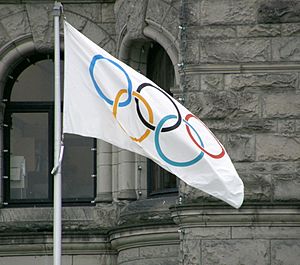
The Olympic Movement uses symbols to show the ideas of the Olympic Charter. The Olympic symbol, known as the Olympic rings, has five rings linked together. They represent the unity of the five inhabited continents: Africa, the Americas (North and South America together), Asia, Europe, and Oceania. The colored rings—blue, yellow, black, green, and red—on a white background form the Olympic flag. These colors were chosen because every country's flag has at least one of them. The flag was adopted in 1914. It was first flown at the 1920 Summer Olympics in Antwerp, Belgium. It has been used at every Games since then. The IOC owns and controls how the Olympic Symbols are used.
The Olympic motto is Citius, Altius, Fortius. This is a Latin phrase meaning "Faster, Higher, Stronger." It was suggested by Pierre de Coubertin in 1894 and became official in 1924. The motto was created by Coubertin's friend, a priest named Henri Didon.
Coubertin's Olympic ideas are also in the Olympic creed:
The most important thing in the Olympic Games is not to win but to take part, just as the most important thing in life is not the triumph but the struggle. The essential thing is not to have conquered but to have fought well.
Months before each Games, the Olympic flame is lit at the Temple of Hera in Olympia, Greece. This ceremony follows ancient Greek traditions. A female performer, acting as a priestess, lights a torch using the sun's rays focused by a special mirror. She then lights the torch of the first relay runner, who is a Greek athlete. This starts the Olympic torch relay. The flame is carried to the host city's Olympic stadium. It plays an important part in the opening ceremony. The flame has been an Olympic symbol since 1928. The torch relay was first used at the 1936 Summer Games.
The Olympic mascot was introduced in 1968. It is an animal, a human, or a cartoon-like figure that represents the host country's culture. Mascots have been important for promoting the Games since the 1980 Summer Olympics. The Soviet bear cub Misha became internationally famous. The mascot for the London Summer Olympics was named Wenlock, after the town of Much Wenlock. This town still hosts the Wenlock Olympian Games, which inspired Pierre de Coubertin. The mascot for the Paris 2024 Olympic Games is a Phrygian cap, like the one Marianne wore during the French Revolution.
Olympic Ceremonies
Opening Ceremony: Kicking Off the Games
The opening ceremony of the Olympic Games follows specific rules from the Olympic Charter. It happens on a Friday before most sports events begin. Many of the traditions for the opening ceremony started at the 1920 Summer Olympics. The ceremony usually starts with the arrival of the IOC president and a representative from the host country. Then, the host country's flag is raised, and its national anthem is played. The host nation then performs artistic shows with music, singing, dance, and theater that show its culture. These artistic shows have become bigger and more complex over time. The opening ceremony for the Beijing Games reportedly cost US$100 million.
After the artistic part, the athletes parade into the stadium, grouped by nation. Greece always enters first to honor the origins of the Olympics. Other nations then enter alphabetically based on the host country's chosen language. The host country's athletes are always the last to enter. During the 2004 Summer Olympics in Athens, the Greek flag entered first, and the Greek team entered last. Since the 2020 Summer Olympics, the next host cities for the upcoming Games enter right before the current host.
Speeches are given by the head of the organizing committee, the IOC president, and the host country's leader. They officially open the Games. Finally, the Olympic torch is brought into the stadium. It is passed along until it reaches the final torch bearer, often a famous athlete from the host nation. This person lights the Olympic flame in the stadium's cauldron.
Closing Ceremony: Saying Goodbye to the Games
The closing ceremony happens on a Sunday, after all the sports events are finished. Flag-bearers from each country enter the stadium. Then, all the athletes enter together, without being grouped by nation. Three national flags are raised while their anthems play: the flag of the current host country, the flag of Greece (to honor the birthplace of the Games), and the flag of the country hosting the next Summer or Winter Olympic Games.
The head of the organizing committee and the IOC president give their closing speeches. The Games are officially closed, and the Olympic flame is put out. In a tradition called the Antwerp Ceremony, the mayor of the current host city passes a special Olympic flag to the IOC president. The president then gives it to the mayor of the city hosting the next Games. The next host nation then gives a short artistic performance to introduce itself.
The last medal ceremony of the Games is usually held during the closing ceremony. For the Summer Olympics, it's usually the marathon medals. For the Winter Olympics, it's the cross-country skiing mass start medals.
Medal Presentation: Honoring the Winners
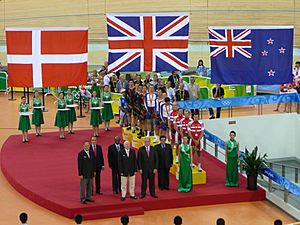
After each Olympic event, a medal ceremony is held. The first, second, and third-place athletes or teams stand on a three-level platform. A member of the IOC gives them their medals. Winners get gold medals, which were solid gold until 1912. Now, they are gold-plated silver. Every gold medal must have at least six grams of pure gold. Second-place winners get silver medals, and third-place athletes get bronze medals. In some events, like boxing, where there isn't a third-place match, both semi-final losers get a bronze medal.
At the 1896 Olympics, only the winner and runner-up received medals. The winner got silver, and the runner-up got bronze. There were no gold medals. The current three-medal system started at the 1904 Olympics. Since 1948, athletes who finish fourth, fifth, and sixth have received certificates called Olympic diplomas. Since 1984, these are also given to seventh and eighth-place finishers. At the 2004 Athens Olympics, medal winners also received olive wreaths. The IOC does not officially track medal counts by country, but national Olympic committees and the media do. They use these counts to measure each nation's success.
Olympic Sports: What's Played
The Olympic Games program includes 35 sports, 30 different types of sports (disciplines), and 408 events. For example, wrestling is a Summer Olympic sport. It has two disciplines: Greco-Roman and Freestyle. These are further divided into different weight classes for men and women. The Summer Olympics program has 26 sports, and the Winter Olympics program has 15 sports. Athletics, swimming, fencing, and artistic gymnastics are the only summer sports that have been in every Olympic program. Cross-country skiing, figure skating, ice hockey, Nordic combined, ski jumping, and speed skating have been in every Winter Olympics since 1924. Some current Olympic sports, like badminton, basketball, and volleyball, first appeared as test sports. Later, they became full Olympic sports. Some sports from earlier Games were later removed.
International sports federations (IFs) manage Olympic sports. The IOC recognizes 35 such federations. Some sports are recognized by the IOC but are not in the Olympic program. These can be added later if they meet certain rules. Sports can be added or removed from the program based on a two-thirds vote by IOC members. Some recognized sports, like orienteering, have never been in the Olympics.
In 2004, the IOC created a commission to review sports for the Olympic program. They set seven rules to decide if a sport should be included. These rules included the sport's history, how widely it's played, its popularity, its image, athlete health, the sport's international federation, and the cost of holding the sport. From this review, five sports were suggested for the 2012 Summer Olympics: golf, karate, rugby sevens, roller sports, and squash. Only karate and squash were chosen as finalists, but neither got enough votes. In October 2009, the IOC voted to add golf and rugby sevens for the 2016 and 2020 Summer Olympic Games.
In 2002, the IOC limited the Summer Games program to a maximum of 28 sports, 301 events, and 10,500 athletes. In 2005, baseball and softball were removed from the 2012 London Games. Since no other sports were added, the 2012 program had only 26 sports. The 2016 and 2020 Games returned to 28 sports with the addition of rugby and golf.
Amateur vs. Professional Athletes
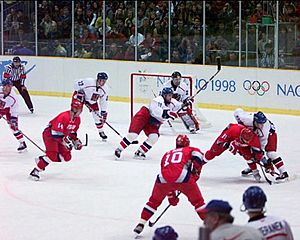
The idea of amateur sports greatly influenced Pierre de Coubertin. He believed that sports were an important part of education. The saying mens sana in corpore sano (a healthy mind in a healthy body) was important. In this view, a true gentleman was good at many things, not just one. It was also believed that practicing too much was like cheating. Those who played sports professionally were thought to have an unfair advantage over those who played just for fun.
Not allowing professionals caused problems in the Olympics. Jim Thorpe, who won the 1912 Olympic pentathlon and decathlon, lost his medals. It was found that he had played semi-professional baseball before the Olympics. His medals were given back to him after his death in 1983. Swiss and Austrian skiers boycotted the 1936 Winter Olympics. They supported their skiing teachers, who were not allowed to compete because they earned money from their sport.
The rise of government-sponsored "full-time amateur athletes" from Eastern Bloc countries changed things. These athletes were paid by their countries to train all the time. This put self-financed amateur athletes from Western countries at a disadvantage. This was a big reason why American medal counts dropped in the 1970s and 1980s. Because of this, the Olympics moved away from strict amateurism. Professional athletes were allowed to compete, but only in the 1990s, after the collapse of the Soviet Union.
Ice Hockey Rules Change
In the late 1960s, the Canadian Amateur Hockey Association (CAHA) felt their amateur players couldn't compete with the Soviet team's full-time athletes. They wanted to use players from professional leagues. But the International Ice Hockey Federation (IIHF) and IOC disagreed. In 1969, the IIHF decided to let Canada use nine non-NHL professional hockey players at the 1970 World Championships. But this decision was reversed in January 1970. The IOC president said ice hockey might be removed from the Olympics if the rule changed. In response, Canada stopped playing in international ice hockey. They said they wouldn't return until "open competition" was allowed.
In 1975, Günther Sabetzki became president of the IIHF and helped solve the problem. In 1976, the IIHF agreed to allow "open competition" for all players in the World Championships. However, NHL players were still not allowed in the Olympics until 1988 because of the IOC's amateur-only rule.
Citizenship and Olympic Rules
IOC Rules for Citizenship
The Olympic Charter says that an athlete must be a legal citizen of the country they compete for. If an athlete has dual citizenship, they can compete for either country. But if they have competed for one country before, they usually have to wait three years before competing for another. However, if the national Olympic committees and sports federations agree, the IOC can shorten or remove this waiting period. This waiting period only applies to athletes who have already competed for one nation and want to switch. If an athlete gets a new or second citizenship, they don't have to wait before competing for their new country. The IOC only deals with citizenship issues after countries have granted citizenship to athletes.
In October 2023, the IOC suspended the Russian Olympic Committee. This suspension was confirmed in February 2024. Because there was no Russian NOC to approve citizenship changes in under three years, the IOC approved changes for five athletes from Russia to other countries in November 2023 and March 2024. These included wrestlers Georgi Tiblov and Aleksandr Komarov (to Serbia), cyclist Mikhail Yakovlev (to Israel), and swimmer Anastasiia Kirpichnikova and cyclist Valeriia Liubimova (both to France).
Why Athletes Change Citizenship
Sometimes, an athlete becomes a citizen of a different country to compete in the Olympics. This often happens because they are offered sponsorship deals or better training facilities in the new country. Or, the athlete might not be able to qualify for the Olympics in their birth country. For the 2014 Winter Olympics in Sochi, Russia gave citizenship to a South Korean-born speed-skater, Ahn Hyun-soo, and an American-born snowboarder, Vic Wild. These two athletes won five gold medals and one bronze medal together at the 2014 Games.
Olympic Champions and Medallists
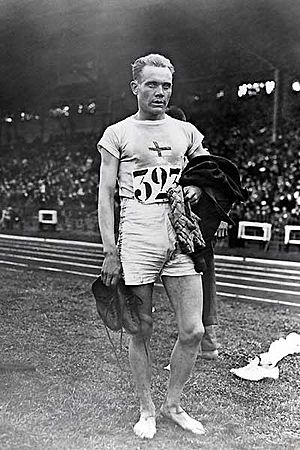
Medals are given to the athletes or teams who finish first, second, and third in each event. Winners get gold medals. These were solid gold until 1912. Now, they are made of gold-plated silver. Every gold medal must have at least six grams of pure gold. Second-place winners get silver medals, and third-place athletes get bronze medals. In some events, like boxing, where there are no third-place matches, the losers of both semi-finals each receive a bronze medal.
At the 1896 Olympics, only the winner and runner-up received medals. The winner got silver, and the runner-up got bronze. No gold medals were given. The current three-medal system started at the 1904 Olympics. Since 1948, athletes who finish fourth, fifth, and sixth have received certificates called Olympic diplomas. Since 1984, these are also given to seventh and eighth-place finishers. At the 2004 Athens Olympics, gold, silver, and bronze medal winners also received olive wreaths. The IOC does not keep official statistics of medals won by each country (except for team sports). But national Olympic committees and the media record medal statistics. They use these to measure each nation's success.
Participating Nations and Host Cities
Countries in the Games
As of the 2020 Summer Games in Tokyo, all of the current 207 national Olympic committees (NOCs) and 19 older NOCs have taken part in at least one Summer Olympics. Athletes from five nations—Australia, France, Great Britain, Greece, and Switzerland—have competed in all 28 Summer Olympics. Teams competing under the Olympic flag, Mixed Teams, and the Refugee Team have competed in six Summer Olympics.
A total of 119 NOCs have participated in at least one Winter Olympics. Athletes from 12 nations—Austria, Canada, Finland, France, Great Britain, Hungary, Italy, Norway, Poland, Sweden, Switzerland, and the United States—have competed in all 23 Winter Games so far.
Choosing Host Nations and Cities
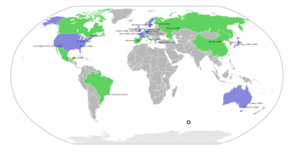
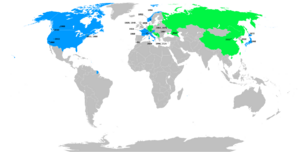
The host city for the Olympic Games used to be chosen seven to eight years before the Games. But for the 2024 and 2028 Olympics, the IOC started announcing the winning bid much earlier. This gives cities more time to prepare. The selection process has two parts and takes two years. First, a city applies to its country's National Olympic Committee. If more than one city from the same country applies, the national committee usually chooses one. Only one city per country can be presented to the IOC.
Once the applications are in, the first phase begins. Cities answer questions about how they would organize the Games. They must promise to follow the Olympic Charter and IOC rules. The IOC reviews these answers to see each city's potential. Based on this, the IOC chooses which cities will move to the next stage.
In the next stage, the chosen cities submit a more detailed plan. An evaluation team carefully studies each city. This team also visits the cities, talks to local officials, and checks out possible venues. They then write a report before the IOC makes its final decision. During this process, the city must also promise it can pay for the Games. After the evaluation, a list of candidates is presented to the IOC members. They meet in a country that does not have a city running for the Games. The IOC members then vote on the host city. Once a city is chosen, its bid committee and national Olympic committee sign a contract with the IOC. This officially makes them an Olympic host nation and host city.
By 2032, the Olympic Games will have been hosted by 47 cities in 23 countries. Since the 1988 Summer Olympics in Seoul, South Korea, the Olympics have been held in Asia or Oceania four times. This is a big increase compared to the previous 92 years. The 2016 Games in Rio de Janeiro were the first Olympics for a South American country. No bids from countries in Africa have won yet, even though Egypt and South Africa have tried.
More to Explore
- All-time Olympic Games medal table
- Art competitions at the Summer Olympics
- List of multi-sport events
- Olympic Cup and Olympic Order
- Olympic Day Run
- Global Association of International Sports Federations
- Participation of women in the Olympics
Cool Facts About the Olympics
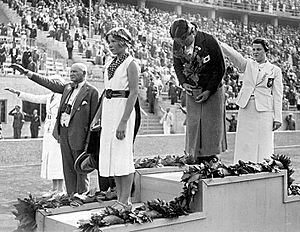
- Gold medals were made of pure gold until 1912. Today, they are mostly silver with a thin layer of gold on top.
- The medals for the 2020 Summer Olympics in Tokyo were made from recycled electronics. This included old smartphones, digital cameras, gaming consoles, and laptops!
- In 1908, the Olympics lasted for a very long time – 187 days!
- The youngest person to win an individual medal was Inge Sørensen from Denmark. She was only 12 years old when she won a bronze medal in swimming in 1936.
- The five rings on the Olympic flag stand for the five continents of the world. These are Africa, America, Asia, Europe, and Oceania. The colors of the rings (blue, yellow, black, green, and red) were chosen because at least one of these colors appears on the flag of every country that competes.
- In the 1912 Olympics, there was a wrestling match that went on for 11 hours!
- Electronic timing devices were first used in 1912 to make sure results were super accurate.
- During the opening ceremony, the host country's team always walks in last. The first country to enter is always Greece, because that's where the Olympics started. This parade tradition began at the 1908 Games in London.
- Nadia Comăneci was the first gymnast to ever score a perfect 10.
- Michael Phelps has won the most Olympic medals of any athlete. He has an amazing 28 medals, including 23 gold!
See also
 In Spanish: Juegos Olímpicos para niños
In Spanish: Juegos Olímpicos para niños
 | Kyle Baker |
 | Joseph Yoakum |
 | Laura Wheeler Waring |
 | Henry Ossawa Tanner |



